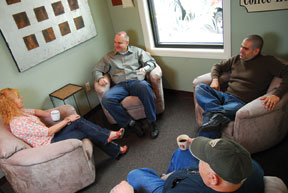
 Dave Browning, Christ the King Community Church, Burlington, WA
Dave Browning, Christ the King Community Church, Burlington, WA
By Ronald E. Keener
Talk with Dave Browning and you’ll soon pick up on how he peppers the conversation with “our story” and “this story.” The unique congregation that is Christ the King Community Church is indeed a story, and he’s written a book, Deliberate Simplicity, that explains the philosophy of his multi-state, multi-country church.
Right at the top of the preface he writes about his early pastorate and dealing with career and marriage challenges. In talking with Church Executive he shared:
“I went through a major personal meltdown that resulted in me stepping down from ministry. For a time I was also separated from my wife, but by God’s grace we were able to reconcile. It was a traumatic period in which I was uncertain about a lot of things, but one thing was sure: I would never be a pastor again. Of course, God had other ideas. While I had given up on him, he never gave up on me,” he says.
In the midst of his “meltdown,” he ended up on the back row of a non-denominational church called Christ the King Community Church in Bellingham, WA.
“After going through a period of intensive healing and restoration, I came on the staff of that church, and eventually found myself planting a daughter church [of the same name but in neighboring Burlington] that has since expanded into a mini-movement,” he says.
You have a couple dozen worship centers now. How many small groups?
That’s a good question that I don’t have a good answer for. It numbers in the thousands, and it has gotten out of control, which is OK by us. The last census indicated we had about 23,400 people in small groups, but we have added several hundred leaders since then.
How do you describe the size of CTK today?
It has become nearly impossible for CTK to track attendance figures. Along with rapid growth on various continents, and the challenge of new groups forming on a regular basis, we also have intermittent reporting and tend to report the number of groups, rather than individuals. For now, we say we are tens of thousands, convened in thousands of small groups and scores of Worship Centers.
Frankly, we are praying that this counting mess gets way worse, and that we will eventually have to throw up our hands in despair and say, “We have absolutely no idea how many people are associated with our church.” That would be our dream.
What plan will lead you to the “thousands of sites” — mentioned in your book — as a multi-location church?
Our strategy is to multiply groups by multiplying leaders. By multiplying leaders, we multiply impact and fuel the rapid expansion of Christ’s kingdom. CTK is a church of small groups. We see them as the basic building block of the church, and the primary way that we care for people. Small groups are our plan A. We don’t have a plan B.
 You’ve mentioned having an upsurge of inquiries about the CTK model. Suppose I wanted to begin a CTK church in Mesa, AZ. How would I go about that?
You’ve mentioned having an upsurge of inquiries about the CTK model. Suppose I wanted to begin a CTK church in Mesa, AZ. How would I go about that?
We say that “the place of agreement is the place of power.” If your personal mission, vision and values align with our mission, vision and values, then you may very well belong in this story. We usually find out by simply having you get to know us, and we get to know you. If you go to our Web site, you will find a four-step relational process that mirrors a dating relationship: get acquainted, get serious, get engaged, and go public. But if someone feels like they belong in this story, we are generally predisposed to say, “Yes, Sure, You Bet!”
Why would I pick the CTK model over so many others?
I’m not sure you would. I subscribe to the “no model is perfect, some are useful” philosophy. The chief benefits of the CTK story are its nimbleness and speed. We are “deliberately simple.” We have put the ministry into the hands of the people.
This gives us opportunities to reach into smaller pockets at lower cost than traditional structures.
But frankly, there are aspects of the CTK story that defy cause and effect. By that, I mean that there have been many effects that don’t have a human cause. Clearly this is a God-thing. But on the other hand, we have worked hard to cooperate with him in what he has been doing. Most folks who engage with us are tired of “business at usual” in the church, want to return to relationships as “the main thing,” and want to escape bureaucracy and find freedom to do what God has called them to do.
What do you feel about megachurches? Are they becoming too large?
I’m glad they are there, but I’m not sure I would want to pastor one. There is a spectrum out there, from house to house to temple courts; from intimacy to impact. The mega church definitely makes an impact and I am glad they do. But right now I am drawn to the powerful blend you see in networks — small pieces loosely joined.
Every community church has small groups. How do yours differ? When do the groups become a worship center?
In our case, small groups are our nearly exclusive activity. They are not just a program in our church, they are our church. We are a house to house plus temple courts story.
But we tell people, “If you can only give us one meeting a week, go to your small group. There are things that you are going to get in your small group that you are not going to get by coming here on Sunday and looking at the back of someone’s head.”
Also, in many churches, small groups are viewed as a vehicle for Christian education. At CTK, we believe that the “gap” that is challenging most people is not the gap between what they know and what they need to know; it is the gap between what they know and what they are living. Most believers are trafficking in unlived truth. They know more than they are putting into practice. Consequently, the most important thing that gets delivered in a small group is encouragement to live out your faith.
What’s your business model in making CTK work? How do you manage such a far flung organization?
Every Worship Center is a “profit center” — to use business language, which we don’t usually like to do — that has its own income and expenses. The individual budgets roll up into a master budget for the entire network. Budgeting begins with the local pastor, using guidelines we provide: 50 percent personnel, 20 percent plant, 20 percent program, 10 percent pay it forward (PIF).
We use PIF funds to develop and expand the network, and about half of those funds are used for Network Resources (accounting, graphics, insurance, etc.). We have a relational network that involves group leaders relating to directors, who relate to pastors, who relate to area pastors, who relate to regional pastors, who relate to national pastors. We ask each of these relationships to be refreshed at least monthly.
Do you use a software program for communication and management and record keeping?
We use off-the-shelf programs like Fellowship One, Quickbooks, Google Apps, and SiteOrganic to stay connected digitally.
You say that Deliberate Simplicity “is a ‘boots on the ground’ approach to the church’s mission. We believe that if we can get God’s people to simply love God and love people, the church cannot be stopped.” Can you explain further?
I believe that Jesus gave some definition to “deliberate simplicity” when he said, “It’s all about love … loving God and loving people.” In fact, we have not found anything more powerful to work with than love. We don’t think our mission is to impress people into the kingdom of God, but to love them into the kingdom of God. There’s faith, there’s hope, there’s love. But love is the greatest of the gifts we can receive or give. When people feel truly loved, nothing can beat that.
We’re not world-class lovers yet, but we’re aspiring to be.
How do you design the church to be simple?
First, I think you need to define what you mean by “church.” I don’t believe that church is a building or a program, it’s a people. Once you know that the church is people, the follow up question is “how many do you need?” I believe Jesus answered that when he said, “Two or three.”
Once you realize that two people gathered in Jesus’ name is the church, then you can begin to set up your ministry to encourage these sorts of meetings here, there and everywhere. The pastor now moves from doing the ministry to seeing that the ministry gets done. His role is one of equipping. The weekend service becomes a convention of cells, and secondary to what happens in small groups. We discourage top-down centralized programming and encourage bottom-up decentralized ministry.
How are people reacting to the premise of the book? What do they take issue with?
I’m having a number of pastors contact me and basically say, “You have put into words what I have been feeling for a long time.”
So I have mainly been encouraged to know that God is using the book to at least give some definition to the questions being asked. Probably the biggest question that comes up with the book is accountability, or “How do you protect from false doctrine?” The answer is that we are responsive to issues as they arise, and we anticipate that they will arise.
We subscribe to the “2 percent rule.” The 2 percent rule says that out of every 100 groups we start, two will go wildly sideways. This is based on our actual experience. Out of the first 100 small groups we started, two of them went sideways — one theologically and one relationally.
Knowing the 2 percent rule, we face choices as a church. Do we (a) invest our efforts into trying to prevent the 2 percent from happening through extensive reporting and meetings (in which the 2 percent will still happen; we’ve just burned up a lot of energy trying to stop it), or do we (b) put our efforts into reaching out, but prepare ourselves mentally and spiritually for dealing swiftly with issues as they arise?
At CTK we have chosen the second course. Instead of organizing to keep the 2 percent from happening, we have chosen to put our energies into reaching out and supporting the 98 percent. As a friend of mine likes to say, “If you use your hands to cover your butt, it doesn’t leave any hands to do the work.”
How will we find out if people are teaching false doctrine or straying morally? The answer is simple: “People love to tattle.” How did Paul find out about the moral dysfunction at Corinth? It was reported to him. We don’t need to go looking for trouble for it to appear. Years ago, when we had a small group go “sideways” theologically, someone in the group placed a call to me almost immediately and let me know what was being espoused. I was able to deal directly with the error and “cut out the cancer.”
 Keep it simple, for the church’s sake
Keep it simple, for the church’s sake
Dave Browning has written the book Deliberate Simplicity: How the Church Does More by Doing Less (Zondervan, 2009, a Leadership
Network Innovation Series book). Excerpts from the introduction:
“Each epoch of church history has introduced its own layers of complexity. The medieval church introduced hierarchical control, the reformed church introduced theological correctness, the corporate church introduced programmatic complexity. It doesn’t matter how we got here. We got here. To the extent that today’s church has become political, institutional, or programmatic, we are making it more complicated than it needs to be.
“Complexity causes people to yearn for simple, profound ideas that can be readily related to diverse situations. Deliberate Simplicity delivers these ideas to the church.
“We are espousing simplicity because we haven’t yet figured out how to be complicated. We are simple by design. We believe that simplicity is a preferable way to go about things. That’s not to say that simplicity is necessarily an easier way to go about things. Simplicity requires a lot of prayer, thought, hard work, and discipline. The paradox of simplicity has been called Meyer’s Law: It is a simple task to make things complex, but a complex task to make them simple.”


